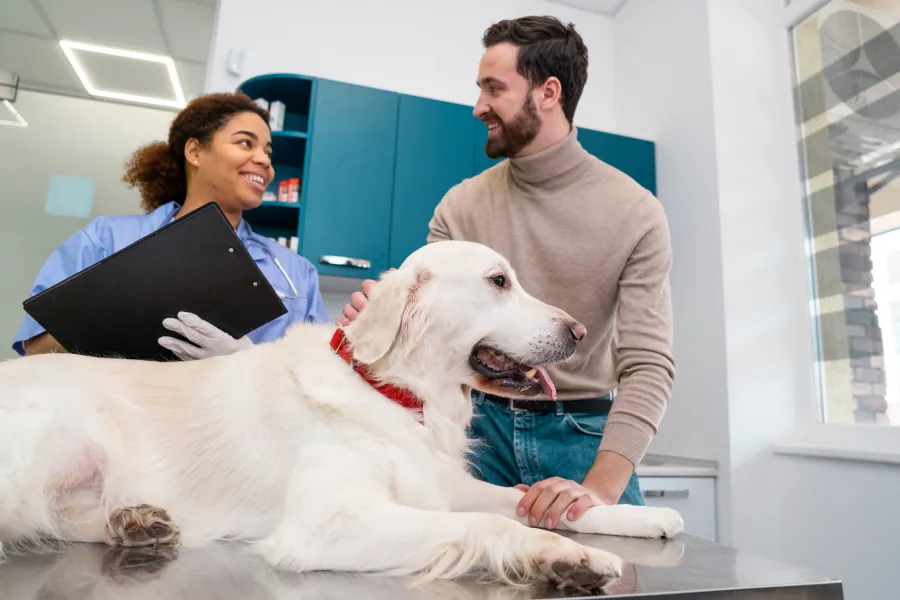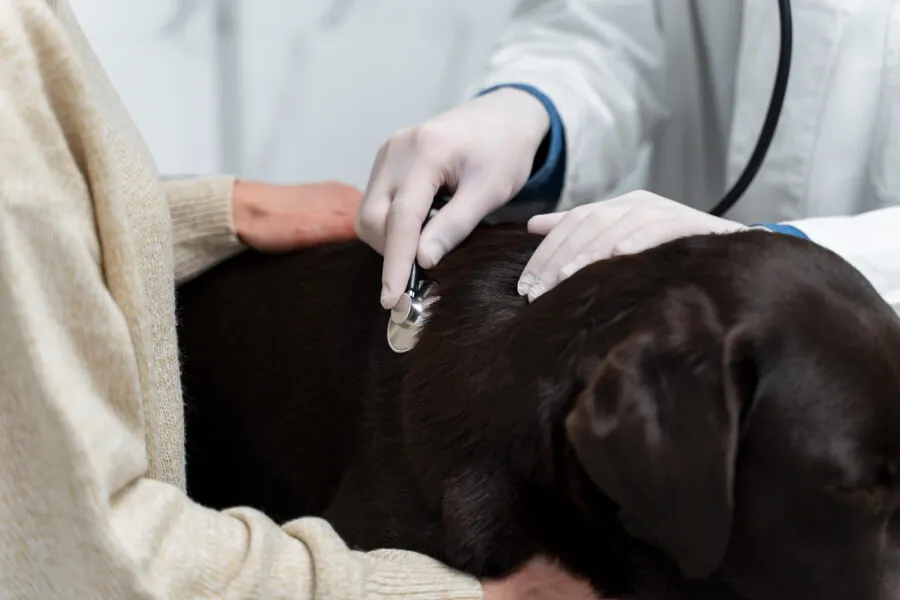Common Symptoms and Signs of Allergies in Dogs
Dog’s Allergies manifest in various ways, making it essential to recognize the symptoms early on. Common signs include:
- Excessive Scratching or Licking: Often directed at the paws, ears, or back.
- Red, Inflamed Skin: Can appear as rashes, hives, or general redness.
- Hair Loss: Due to constant scratching or licking.
- Ear Infections: Frequent head shaking and ear scratching are common.
- Respiratory Issues: Sneezing, coughing, or wheezing.
- Watery or Red Eyes: Indicating irritation.
- Digestive Problems: Vomiting or diarrhea.
Understanding these symptoms is the first step in addressing your dog’s allergies effectively.
Possible Allergens that Affect Dogs
Identifying the allergens affecting your dog is crucial for effective treatment. Common allergens include:
- Environmental Allergens: Pollen, mold, dust mites, and dander.
- Food Allergens: Proteins in beef, chicken, dairy, or grains.
- Flea Allergy Dermatitis: Reaction to flea saliva.
- Contact Allergens: Substances like shampoos, cleaning products, or certain plants.
Pinpointing the exact allergen can be tricky, but it’s vital for managing your dog’s condition.
At-Home Remedies for Dog Allergies
Home remedies can provide relief for mild allergy symptoms and serve as a complementary approach to vet care. Here are some effective at-home solutions:
Apple Cider Vinegar
Benefits: Antibacterial and antifungal properties.
Usage:
- Topical Application: Mix equal parts apple cider vinegar and water in a spray bottle. Apply to affected areas, avoiding open wounds.
- Internal Use: Add a teaspoon of apple cider vinegar to your dog’s water bowl (adjust for size).
Coconut Oil
Benefits: Contains lauric acid with antibacterial, antifungal, and anti-inflammatory properties.
Usage:
- Topical Application: Rub a small amount on your dog’s skin to soothe dryness and inflammation.
- Internal Use: Add a small amount to your dog’s food (start with a teaspoon for small dogs and a tablespoon for larger dogs).
Frequent Bathing
Benefits: Anti-inflammatory and antioxidant properties soothe irritated skin.
Usage:
- Grind plain oatmeal into a fine powder.
- Add the oatmeal to warm water in a bathtub.
- Let your dog soak for 10-15 minutes before rinsing thoroughly.
Steroids
Benefits: The Versatile Effect for a range of allergic conditions, including atopic dermatitis, flea allergy dermatitis, and dog’s allergies.
Usage:
- Administration: Steroids can be administered orally, topically, or through injection. The method depends on the severity and location of the allergy.
- Dosage: Dosage is typically tapered to the minimum effective dose to reduce side effects. Long-term use requires careful monitoring.
- Short-term vs. Long-term: Short-term use is preferred due to the potential for serious side effects with long-term use, such as immunosuppression, weight gain, increased thirst and urination, and potential for diabetes and Cushing’s disease.
Omega-3 Fatty Acids
Benefits: Reduce inflammation and improve skin health.
Usage: Add fish oil supplements to your dog’s diet.
Beneficial Practices for Managing Your Dog’s Allergies at Home
In addition to remedies, adopting certain practices can help manage your dog’s allergies more effectively:
Regular Grooming
- Bathing: Use hypoallergenic shampoos to reduce allergens on your dog’s skin and coat.
- Brushing: Regular brushing helps remove allergens trapped in your dog’s fur.
Clean Living Environment
- Vacuum Frequently: Remove dust and dander from carpets and furniture.
- Wash Bedding: Clean your dog’s bedding regularly to reduce allergen buildup.
- Air Purifiers: Use air purifiers to keep indoor air clean.
Diet Management
- Elimination Diet: Identify and remove potential food allergens from your dog’s diet.
- Hypoallergenic Food: Consider switching to hypoallergenic dog food.
When to Consult a Veterinarian
While home remedies can be effective for mild symptoms, certain situations require professional veterinary care. Here are signs indicating the need for a vet visit for Dog’s Allergies:
Persistent or Severe Symptoms
- Chronic Scratching or Licking: If your dog’s discomfort persists despite home treatment.
- Recurring Ear Infections: Frequent infections could indicate underlying allergies.
- Respiratory Distress: Ongoing coughing, wheezing, or difficulty breathing.
Signs of Infection
- Open Sores or Pus: Indicative of bacterial infection.
- Unusual Odors: From the skin or ears, suggesting infection.
Significant Behavioral Changes
- Lethargy: Unusual tiredness or lack of energy.
- Loss of Appetite: Could indicate a severe allergic reaction or other health issues.
Digestive Issues
- Chronic Vomiting or Diarrhea: Persistent digestive problems warrant a vet’s attention.
The Importance of Proper Diagnosis and Treatment
A veterinarian can provide a thorough diagnosis and treatment plan, which is essential for managing severe allergies. Here’s why professional care is crucial:
Accurate Diagnosis
- Allergy Testing: Identifies specific allergens affecting your dog.
- Comprehensive Exams: Rule out other health conditions with similar symptoms.
Effective Treatment Plans
- Medications: Prescription antihistamines, steroids, or other medications tailored to your dog’s needs.
- Specialized Diets: Custom dietary plans to avoid specific allergens.
Long-term Management
- Immunotherapy: Allergy shots or drops to desensitize your dog to specific allergens.
- Ongoing Monitoring: Regular check-ups to adjust treatment plans as needed.
Medical Options for Treating Dog Allergies
When home remedies aren’t enough, medical treatments can provide significant relief:
Prescription Medications
- Antihistamines: Reduce itching and inflammation.
- Corticosteroids: Manage severe allergic reactions.
- Immunosuppressants: Control the immune system’s response.
Allergy Testing and Immunotherapy
- Skin Tests: Identify specific allergens.
- Blood Tests: Measure the immune response to allergens.
- Immunotherapy: Gradually introduces allergens to build tolerance.
Final Considerations
Tips for Preventing Allergies in Dogs
Prevention is key to managing allergies. Here are some tips:
- Regular Cleaning: Keep your home free of dust and allergens.
- Diet Management: Avoid known food allergens.
- Grooming: Regular baths and grooming sessions.
The Role of Regular Veterinary Check-ups
Routine vet visits are essential for early detection and management of dog’s allergies. Your vet can:
- Monitor Symptoms: Track the progression of allergies.
- Adjust Treatments: Modify treatment plans based on your dog’s response.
Conclusion
Navigating the balance between home remedies and professional vet care for your dog’s allergies can be challenging, but understanding when to use each approach is crucial. Home remedies like apple cider vinegar, coconut oil, and oatmeal baths can provide relief for mild symptoms. However, persistent, severe, or worsening symptoms require the expertise of a veterinarian.
By recognizing the signs that indicate the need for professional help, you can ensure your dog receives the best possible care. Regular veterinary check-ups, accurate diagnoses, and effective treatment plans are essential for managing your dog’s allergies and improving their quality of life. With the right approach, you can help your furry friend live a happy, itch-free life.
FAQs
How can I naturally alleviate my dog’s allergies?
You can try dietary changes, omega-3 fatty acids, probiotics, apple cider vinegar rinses, regular oatmeal baths, and maintaining a clean home environment for Dog’s Allergies.
What is a natural solution for my dog’s itching?
An oatmeal bath can provide relief. Grind plain oatmeal, add it to warm water, and let your dog soak for 10-15 minutes.
What remedies can I give my dog for her allergies?
Consider coconut oil, quercetin supplements, probiotics, fish oil, and chamomile tea for relief from dog’s allergies symptoms.
What can I put on my dog’s skin for allergies?
You can use aloe vera gel, diluted apple cider vinegar spray, coconut oil, or an oatmeal paste to soothe irritated skin.








